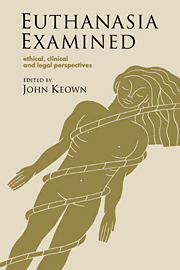Book contents
- Frontmatter
- Contents
- List of contributors
- Acknowledgements
- Foreword by Daniel Callahan
- Introduction
- 1 Euthanasia and the value of life
- 2 A philosophical case against euthanasia
- 3 The philosophical case against the philosophical case against euthanasia
- 4 The fragile case for euthanasia: a reply to John Harris
- 5 Final thoughts on final acts
- 6 Misunderstanding the case against euthanasia: response to Harris's first reply
- 7 Euthanasia: back to the future
- 8 The case for legalising voluntary euthanasia
- 9 Extracts from the Report of the House of Lords Select Committee on Medical Ethics
- 10 Walton, Davies, Boyd and the legalization of euthanasia
- 11 Where there is hope, there is life: a view from the hospice
- 12 Letting vegetative patients die
- 13 A case for sometimes tube-feeding patients in persistent vegetative state
- 14 Dilemmas at life's end: a comparative legal perspective
- 15 Physician-assisted suicide: the last bridge to active voluntary euthanasia
- 16 Euthanasia in the Netherlands: sliding down the slippery slope?
- 17 Advance directives: a legal and ethical analysis
- 18 Theological aspects of euthanasia
- Index
9 - Extracts from the Report of the House of Lords Select Committee on Medical Ethics
Published online by Cambridge University Press: 03 May 2010
- Frontmatter
- Contents
- List of contributors
- Acknowledgements
- Foreword by Daniel Callahan
- Introduction
- 1 Euthanasia and the value of life
- 2 A philosophical case against euthanasia
- 3 The philosophical case against the philosophical case against euthanasia
- 4 The fragile case for euthanasia: a reply to John Harris
- 5 Final thoughts on final acts
- 6 Misunderstanding the case against euthanasia: response to Harris's first reply
- 7 Euthanasia: back to the future
- 8 The case for legalising voluntary euthanasia
- 9 Extracts from the Report of the House of Lords Select Committee on Medical Ethics
- 10 Walton, Davies, Boyd and the legalization of euthanasia
- 11 Where there is hope, there is life: a view from the hospice
- 12 Letting vegetative patients die
- 13 A case for sometimes tube-feeding patients in persistent vegetative state
- 14 Dilemmas at life's end: a comparative legal perspective
- 15 Physician-assisted suicide: the last bridge to active voluntary euthanasia
- 16 Euthanasia in the Netherlands: sliding down the slippery slope?
- 17 Advance directives: a legal and ethical analysis
- 18 Theological aspects of euthanasia
- Index
Summary
By the Select Committee appointed to consider the ethical, legal and clinical implications of a person's right to withhold consent to life–prolonging treatment, and the position of persons who are no longer able to give or withhold consent;
and to consider whether and in what circumstances actions that have as their intention or a likely consequence the shortening of another person's life may be justified on the grounds that they accord with that person's wishes or with that person's best interests;
and in all the foregoing considerations to pay regard to the likely effects of changes in law or medical practice on society as a whole.
ORDERED TO REPORT
PART 1 INTRODUCTION
BACKGROUND
1. Decisions about medical treatment and the end of life are more complicated now than they have ever been. Such decisions are now more frequent, more difficult and more widely debated than in the past.
2. Perhaps the single most important reason for this is the advances in medicine in recent years, and particularly the application of medical technology. As a result patients live longer, where in the past they would have died at an earlier stage of their illnesses. Conditions which not so long ago would have resulted in certain, and fairly swift, death can now be treated and, if not cured, at least held at bay. For many this has resulted in a welcome prolongation of meaningful life, and avoidance of suffering.
- Type
- Chapter
- Information
- Euthanasia ExaminedEthical, Clinical and Legal Perspectives, pp. 96 - 112Publisher: Cambridge University PressPrint publication year: 1995
- 1
- Cited by



